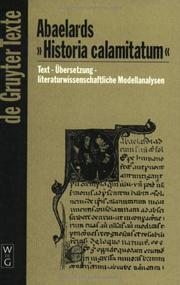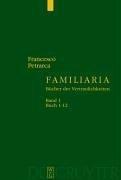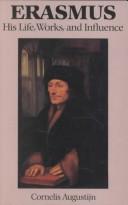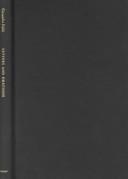| Listing 1 - 10 of 24 | << page >> |
Sort by
|
Book
Year: 2011 Publisher: Project Gutenberg
Abstract | Keywords | Export | Availability | Bookmark
 Loading...
Loading...Choose an application
- Reference Manager
- EndNote
- RefWorks (Direct export to RefWorks)
Authors, Latin (Medieval and modern) --- Abelard, Peter, --- Héloïse,
Book
ISBN: 178683166X 9781786831668 9781786831675 1786831678 9781786831651 1786831651 9781786831637 9781786831644 1786831635 1786831643 Year: 2018 Publisher: Cardiff
Abstract | Keywords | Export | Availability | Bookmark
 Loading...
Loading...Choose an application
- Reference Manager
- EndNote
- RefWorks (Direct export to RefWorks)
Authors, Latin (Medieval and modern) --- Giraldus, --- Wales --- History --- Historiography.

ISBN: 3110170124 3110850575 9783110850574 9783110170122 Year: 2002 Publisher: Berlin New York
Abstract | Keywords | Export | Availability | Bookmark
 Loading...
Loading...Choose an application
- Reference Manager
- EndNote
- RefWorks (Direct export to RefWorks)
Peter Abaelards Autobiographie, die Historia calamitatum, gehört zu den bekanntesten Texten des Mittelalters, insbesondere wegen der Liebesgeschichte zu Heloise, von der sie berichtet. In den letzten Jahrzehnten wurde über die Echtheit der Dokumente, die Abaelard und Heloise betreffen, so viel gestritten, daß die literaturwissenschaftliche Deutung des Werkes ganz in den Hintergrund trat. Aus dieser Sackgasse bietet das vorliegende Buch einen Ausweg. Es macht den berühmten Text zum Gegenstand einer Reihe exemplarischer Analysen aus der Perspektive von sieben verschiedenen Literaturtheorien des 20. Jahrhunderts (Rezeptionsästhetik, Foucault, Gender Studies, Rhetorische Stilanalyse, Literaturpsychologie, Kulturwissenschaft, Dekonstruktion). Diesen Analysen vorangestellt ist der lateinische Text der Historia calamitatum mit einer neuen, in modernem Deutsch gehaltenen Übersetzung. Damit wird die Historia calamitatum erstmals in einer zweisprachigen Ausgabe erschlossen. Peter Abelard's autobiography, the Historia calamitatum, is one of the best-known medieval texts, especially because of the story of his love for Heloise which it recounts. In recent decades, there was so much controversy about the authenticity of the documents concerning Abelard and Heloise that the critical interpretation of the texts was relegated to the sidelines. The present volume provides a way out of this impasse. In it, the famous text is subjected to a series of exemplary analyses from the perspectives of seven different 20th century literary theories (aesthetics of reception, Foucault, Gender Studies, Rhetorical Stylistic Analysis, Psychology of Literature, Cultural Studies, Deconstruction). The analyses are preceded by the Latin text of the Historia calamitatum with a modern German translation. This is thus the first time that the Historia calamitatum has been presented in a bilingual edition.
Translating into German. --- Traduction en allemand --- Abelard, Peter, --- -Authors, Latin (Medieval and modern) --- Latin authors (Medieval and modern) --- Petrus Abaelardus --- Authors, Latin (Medieval and modern) --- Philosophers --- Theologians --- Christian theologians --- Scholars --- Biography&delete& --- History and criticism --- Abaelard, Peter, --- Abaelardi, Petri, --- Abaelardus, --- Abaelardus, Petrus, --- Abailard, Peter, --- Abailard, Pierre, --- Abailardus, Petrus, --- Abeilard, Pierre, --- Abélard, Pierre, --- Abelard, Piotr, --- Abelardo, --- Abelardo, Pietro, --- Abeli︠a︡r, Petr, --- Abelʹi︠a︡rd, Petr, --- אבעלאר, --- Biography --- History and criticism. --- Latin language --- Latin (Langue) --- Abelard, Peter --- Early works to 1800 --- Authors [Latin ] (Medieval and modern) --- France --- Authors, Latin (Medieval and modern) - France - Biography - History and criticism. --- Philosophers - France - Biography - History and criticism. --- Theologians - France - Biography - History and criticism. --- Authors, Latin (Medieval and modern) - France - Biography - Early works to 1800. --- Philosophers - France - Biography - Early works to 1800. --- Theologians - France - Biography - Early works to 1800.

ISBN: 1281993158 9786611993153 3110201887 3110182394 9783110191592 9783110182392 9783110201888 Year: 2005 Publisher: Berlin de Gruyter
Abstract | Keywords | Export | Availability | Bookmark
 Loading...
Loading...Choose an application
- Reference Manager
- EndNote
- RefWorks (Direct export to RefWorks)
In 1350, the Italian humanist and poet Francesco Petrarca decided to form a collection of all his correspondence. The letters deal with multifarious topics, switch between narration and instruction, and the personal and the general, and are addressed to various of his learned friends and contemporaries. They are a treasure trove for the history of ideas. This is the first complete German-language edition of the famous 24 books of the Epistolae familiares ; they have been translated from the Latin by Prof. Berthe Widmer, an acknowledged authority on Petrarch. The translation is accompanied by a
Authors, Italian -- To 1500 -- Correspondence. --- Authors, Latin (Medieval and modern) -- Italy -- Correspondence. --- Pastoral poetry, Latin (Medieval and modern). --- Petrarca, Francesco, 1304-1374 -- Correspondence. --- Romance Literatures --- Italian Literature --- Languages & Literatures --- Authors, Latin (Medieval and modern) --- Authors, Italian --- Petrarca, Francesco, --- Pétrarque --- Petrarch --- Petracco, Francesco --- Petrarca, Francesco (1304-1374) --- Petrarca, Franciscus, --- Petrarch, --- Petrarch, Francesco, --- Petrarcha, Franciscus, --- Petrark, --- Petrarka, Franchesko, --- Peṭrarḳa, Frants'esḳo, --- Pétrarque, --- Петрарка, Франческо, --- פטררקא, פרנצ׳סקו --- Petrarca, Francesco
Book
ISBN: 1282187422 9786612187421 3110215942 9783110215946 9783110191592 Year: 2009 Publisher: Berlin New York De Gruyter
Abstract | Keywords | Export | Availability | Bookmark
 Loading...
Loading...Choose an application
- Reference Manager
- EndNote
- RefWorks (Direct export to RefWorks)
In 1350, the Italian humanist and poet Francesco Petrarca decided to form a collection of all his correspondence. The letters deal with multifarious topics, switch between narration and instruction, the personal and the general, and are addressed to various of his learned friends and contemporaries. Theyconstitute a treasure trove for the history of ideas. This is the first complete German-language edition of the famous 24 books of the Epistolae familiares; they have been translated from the Latin by Prof. Berthe Widmer, an acknowledged authority on Petrarch. The translation is accompanied by
Authors, Latin (Medieval and modern) --- Authors, Italian --- Petrarca, Francesco, --- Pétrarque --- Petrarch --- Petracco, Francesco --- Petrarca, Francesco (1304-1374) --- Petrarca, Franciscus, --- Petrarch, --- Petrarch, Francesco, --- Petrarcha, Franciscus, --- Petrark, --- Petrarka, Franchesko, --- Peṭrarḳa, Frants'esḳo, --- Pétrarque, --- Петрарка, Франческо, --- פטררקא, פרנצ׳סקו --- Petrarca, Francesco --- Petrarca, Francesco.
Book
ISBN: 0691031851 9780691031859 1306986125 0691608431 1400862337 9781400862337 9780691608433 Year: 1991 Publisher: Princeton, New Jersey
Abstract | Keywords | Export | Availability | Bookmark
 Loading...
Loading...Choose an application
- Reference Manager
- EndNote
- RefWorks (Direct export to RefWorks)
In this portrait of the flamboyant Milanese courtier Francesco Filelfo (1398-1481), Diana Robin reveals a fifteenth-century humanism different from the cool, elegant classicism of Medicean Florence and patrician Venice. Although Filelfo served such heads of state as Pope Pius II, Cosimo de' Medici, and Francesco Sforza, his humanism was that of the "other"--the marginalized, exilic writer, whose extraordinary mind yet obscure origins made him a misfit at court. Through an exploration of Filelfo's disturbing montages in his letters and poems--of such events as the Milanese revolution of 1447 and the plague that swept Lombardy in 1451--Robin exposes the extent to which Filelfo, once viewed as an apologist for his patrons, criticized their militarism, sham republicanism, and professions of Christian piety. This study includes an examination of Filelfo's deeply layered references to Horace, Livy, Vergil, and Petrarch, as well as a comparison of Filelfo to other fifteenth-century Lombard writers, such as Cristoforo da Soldo, Pier Candido Decembrio, and Giovanni Simonetta. Here Robin presents her own editions of selections from Filelfo's Epistolae Familiares, Sforziad, Odae, and De Morali Disciplina, many of these texts appearing for the first time since the Renaissance.Originally published in 1991.The Princeton Legacy Library uses the latest print-on-demand technology to again make available previously out-of-print books from the distinguished backlist of Princeton University Press. These editions preserve the original texts of these important books while presenting them in durable paperback and hardcover editions. The goal of the Princeton Legacy Library is to vastly increase access to the rich scholarly heritage found in the thousands of books published by Princeton University Press since its founding in 1905.
Authors, Latin (Medieval and modern) --- -Renaissance --- Renaissance --- Revival of letters --- Civilization --- History, Modern --- Civilization, Medieval --- Civilization, Modern --- Humanism --- Middle Ages --- Correspondence --- History --- Filelfo, Francesco --- Milan (Italy) --- -Milan (Italy) --- -Court and courtiers --- -Correspondence --- Intellectual life --- Filelfo, Francesco, --- Court and courtiers --- Intellectual life. --- Francesco Filelfo --- Philelphus, Franciscus --- Mailand (Italy) --- Milano (Italy) --- Milão (Italy) --- Mediolanum (Italy) --- Comune di Milano (Italy) --- -Mailand (Italy) --- Correspondence. --- Philelphus, Franciscus, --- Philelfus, Franciscus, --- Philelphe, --- Robiatinus, Bernardinus,
Book
ISBN: 0691612277 0691008019 1400858070 0691054215 1322006466 9781400858071 9780691054216 9780691008011 9780691612270 Year: 1984 Publisher: Princeton, New Jersey
Abstract | Keywords | Export | Availability | Bookmark
 Loading...
Loading...Choose an application
- Reference Manager
- EndNote
- RefWorks (Direct export to RefWorks)
Johan Huizinga had a special sympathy for the complex, withdrawn personality of Erasmus and for his advocacy of intellectual and spiritual balance in a quarrelsome age. This biography is a classic work on the sixteenth-century scholar/humanist.Originally published in 1984.The Princeton Legacy Library uses the latest print-on-demand technology to again make available previously out-of-print books from the distinguished backlist of Princeton University Press. These editions preserve the original texts of these important books while presenting them in durable paperback and hardcover editions. The goal of the Princeton Legacy Library is to vastly increase access to the rich scholarly heritage found in the thousands of books published by Princeton University Press since its founding in 1905.
Authors, Latin (Medieval and modern) --- Humanists --- Scholars, Medieval --- Reformation --- Languages & Literatures --- Greek & Latin Languages & Literatures --- Erasmus, Desiderius, --- Netherlands --- Intellectual life --- Medieval scholars --- Desiderius Erasmus, --- Erasm, Dezideriĭ, --- Erasme, Désiré, --- Erasmo, --- Erasmo, Desidério, --- Erasmus, --- Ėrazm, --- Erazm, --- Roterodamus, Erasmus, --- Rotterdamskiĭ, Ėrazm, --- Rotterdamský, Erasmus Desiderius, --- Роттердамский, Эразм, --- Эразм, --- Ерасм, Дезидерий, --- אראסמוס, דסידריוס, --- Erasmus, Desiderius --- Érasme --- Desiderius Erasmus --- Erasm, Dezideriĭ --- Erasme, Désiré --- Erasmo, Desidério --- Roterodamus, Erasmus --- Rotterdamskiĭ, Ėrazm --- Rotterdamský, Erasmus Desiderius --- Роттердамский, Эразм --- Ерасм, Дезидерий --- Erasmus

ISBN: 0802071775 9780802071774 9786612045370 1282045377 1442674571 9781442674578 0802058647 9780802058645 1442654333 9781282045378 9781442654334 Year: 1991 Publisher: Toronto Buffalo University of Toronto Press
Abstract | Keywords | Export | Availability | Bookmark
 Loading...
Loading...Choose an application
- Reference Manager
- EndNote
- RefWorks (Direct export to RefWorks)
Erasmus: His Life, Works, and Influence is a comprehensive introduction to Erasmus's life, works, and thoughts. It integrates the best scholarship of the past twenty years and will appeal to undergraduates in all areas of cultural history as well as Erasmus specialists.
Authors, Latin (Medieval and modern) --- Humanists --- Scholars, Medieval --- Medieval scholars --- Erasmus, Desiderius, --- Erasmus, Desiderius --- Érasme --- Desiderius Erasmus --- Erasm, Dezideriĭ --- Erasme, Désiré --- Erasmo, --- Erasmo, Desidério --- Erasmus, --- Ėrazm, --- Erazm, --- Roterodamus, Erasmus --- Rotterdamskiĭ, Ėrazm --- Rotterdamský, Erasmus Desiderius --- Роттердамский, Эразм --- Эразм, --- Ерасм, Дезидерий --- Criticism and interpretation. --- Netherlands --- Intellectual life --- Erasmus, Desiderius. --- Érasme, --- Critique et interpretation. --- Erasmus Roterodamus, Desiderius --- Erasmus --- Desiderius Erasmus, --- Erasm, Dezideriĭ, --- Erasme, Désiré, --- Erasmo, Desidério, --- Roterodamus, Erasmus, --- Rotterdamskiĭ, Ėrazm, --- Rotterdamský, Erasmus Desiderius, --- Роттердамский, Эразм, --- Ерасм, Дезидерий, --- אראסמוס, דסידריוס, --- エラスムス, デシデリウス --- Érasme (1469-1536) --- Critique et interprétation --- Biographie --- Influence

ISBN: 1281125946 9786611125943 0226590097 9780226590097 9780226590073 0226590070 9780226590080 0226590089 0226590070 0226590089 9781281125941 6611125949 Year: 2004 Publisher: Chicago University of Chicago Press
Abstract | Keywords | Export | Availability | Bookmark
 Loading...
Loading...Choose an application
- Reference Manager
- EndNote
- RefWorks (Direct export to RefWorks)
Renowned in her day for her scholarship and eloquence, Isotta Nogarola (1418-66) remained one of the most famous women of the Italian Renaissance for centuries after her death. And because she was one of the first women to carve out a place for herself in the male-dominated republic of letters, Nogarola served as a crucial role model for generations of aspiring female artists and writers. This volume presents English translations of all of Nogarola's extant works and highlights just how daring and original her convictions were. In her letters and orations, Nogarola elegantly synthesized Greco-Roman thought with biblical teachings. And striding across the stage in public, she lectured the Veronese citizenry on everything from history and religion to politics and morality. But the most influential of Nogarola's works was a performance piece, Dialogue on Adam and Eve, in which she discussed the relative sinfulness of Adam and Eve-thereby opening up a centuries-long debate in Europe on gender and the nature of woman and establishing herself as an important figure in Western intellectual history. This book will be a must read for teachers and students of Women's Studies as well as of Renaissance literature and history.
Speeches, addresses, etc., Latin (Medieval and modern) --- Women --- Authors, Latin (Medieval and modern) --- Humanists --- Human females --- Wimmin --- Woman --- Womon --- Womyn --- Females --- Human beings --- Femininity --- Latin orations, Medieval and modern --- Latin speeches, Medieval and modern --- History --- Nogarola, Isotta, --- Italy --- Verona (Italy) --- Ṿeronah (Italy) --- Intellectual life --- collected works, collection, anthology, letters, discussion, bible, biblical, speeches, speech, oratory, classics, classical, female, feminine, feminist, italy, italian, renaissance, role model, women, womens issues, translation, english, greco roman, thinker, intellectual, verona, morals, morality, sin, humanist, western, literature, literary, performance, college, university.

ISBN: 1281125547 9786611125547 0226239330 9780226239330 9780226239316 0226239314 0226239322 9780226239323 9781281125545 661112554X Year: 2000 Publisher: Chicago University of Chicago Press
Abstract | Keywords | Export | Availability | Bookmark
 Loading...
Loading...Choose an application
- Reference Manager
- EndNote
- RefWorks (Direct export to RefWorks)
By the end of the fifteenth century, Cassandra Fedele (1465-1558), a learned middle-class woman of Venice, was arguably the most famous woman writer and scholar in Europe. A cultural icon in her own time, she regularly corresponded with the king of France, lords of Milan and Naples, the Borgia pope Alexander VI, and even maintained a ten-year epistolary exchange with Queen Isabella and King Ferdinand of Spain that resulted in an invitation for her to join their court. Fedele's letters reveal the central, mediating role she occupied in a community of scholars otherwise inaccessible to women. Her unique admittance into this community is also highlighted by her presence as the first independent woman writer in Italy to speak publicly and, more importantly, the first to address philosophical, political, and moral issues in her own voice. Her three public orations and almost all of her letters, translated into English, are presented here for the first time.
Speeches, addresses, etc., Latin (Medieval and modern) --- Authors, Latin (Medieval and modern) --- Humanists --- Feminists --- Feminism --- Social reformers --- Latin authors (Medieval and modern) --- Latin orations, Medieval and modern --- Latin speeches, Medieval and modern --- Scholars --- Fedele, Cassandra, --- Fidelis, Cassandrae, --- Italy --- Intellectual life --- early modern european literature, lit criticism, 15th century, female authors, women writers, venice, italy, cultural icon, king of france, milan naples, scholarship, renaissance period, pope alexander vi, queen isabella, ferdinand, spain, world leaders, letters, correspondence, epistulary writing, pen pals, independent woman, middle class, moral issues, ethics, social commentary, public orations, politics, history, political figures.
| Listing 1 - 10 of 24 | << page >> |
Sort by
|

 Search
Search Feedback
Feedback About UniCat
About UniCat  Help
Help News
News